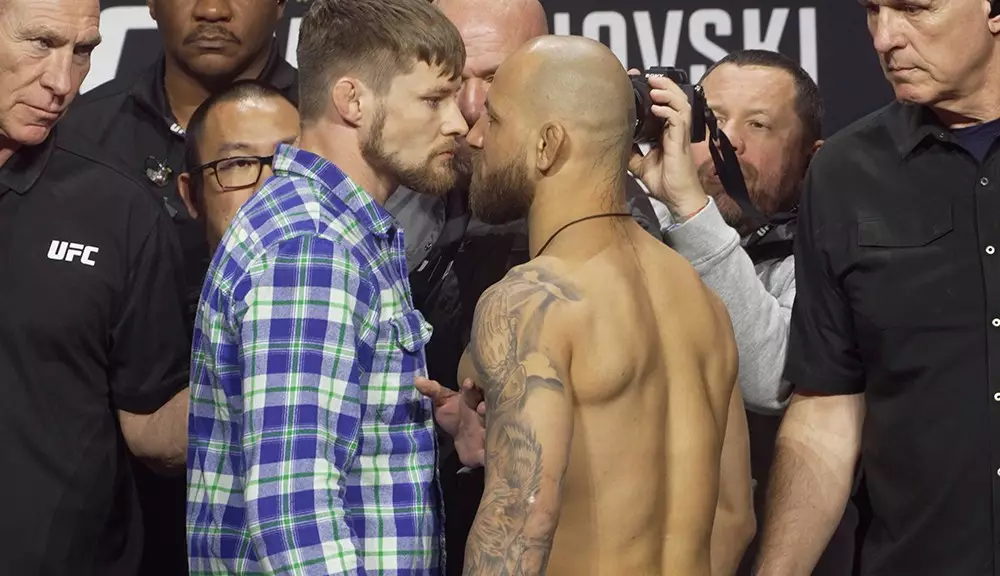In the world of mixed martial arts, mental fortitude is often just as crucial as physical strength. Bryce Mitchell, an outspoken and dedicated fighter, is embracing this philosophy more than ever as he prepares for his upcoming bout against Jean Silva at UFC 314. However, what sets this fight apart isn’t just the physical preparation; it’s the psychological warfare that Mitchell claims has driven him into a spiritual battle. He has openly discussed his haunting dreams, describing them as demonic assaults aimed at unsettling him as he approaches a critical juncture in his career.
Mitchell’s revelation about tormenting dreams raises a fascinating discussion about the mental challenges fighters face in high-stakes competitions. The juxtaposition of battling physical opponents while simultaneously confronting one’s psyche offers an insight into the unique pressures athletes endure. Moreover, the importance of community support is highlighted in Mitchell’s plea for prayers from fellow Christians—an appeal that underscores the significance of faith and camaraderie in overcoming personal struggles.
A Clash of Characters and Beliefs
As the fight date approaches, tension reaches a boiling point, not just between the fighters but also in the realms of public perception. Mitchell’s controversial statements about historical figures and his conceptualization of the world challenge conventional wisdom, often provoking polarized reactions. Silva, for instance, ignited a crowd reaction that showcased how public personas can influence fighter interactions. Chuckling about the flat Earth belief and initiating a chant against Mitchell illustrates the almost theatrical aspects of modern MMA.
It seems more than just a rivalry, it’s a broader dialogue about identity, belief systems, and how they affect the decisions and lives of individuals within the sport. With Silva mocking Mitchell’s views, the stakes escalate, turning this bout into a metaphorical clash of faith and ideology as much as martial skill. It forces fans and participants alike to reflect on how an athlete’s off-the-cuff remarks can take on a life of their own, spiraling into a deeper examination of character and conviction.
The Transformative Power of Facing Fears
Mitchell’s claim that he’s fighting not just for victory but for the glory of a higher cause is significant. It touches upon a theme pervasive in sports—the transformative nature of facing fears head-on. By framing his struggles as those of a spiritual warrior battling not only an opponent but dark forces, he becomes a compelling figure fighting for redemption and purpose. This narrative encourages many to connect on a deeper level with his journey, as it mirrors the internal battles we all face in our lives.
Moreover, it amplifies the ongoing discourse about mental health in athletics, emphasizing that vulnerabilities should not be stigmatized. Instead of silencing these fears, Mitchell’s vocalization invites empathy and understanding, sparking conversations about the realities of mental health challenges that athletes confront. This dual narrative of physical confrontation and mental resilience enlivens the public’s interest and highlights the complexity of being a modern-day athlete.
The Octagon Awaits: The Intersection of Fear and Fortitude
As the fight night approaches, the anticipation surrounding the bout escalates. For Mitchell, the octagon symbolizes more than just a venue for combat; it serves as a battleground for inner demons and external adversaries. His views—possibly considered controversial or eccentric—become part of his fighting persona, injecting excitement and tension into the event.
The dynamics of Mitchell’s fight unveil how deeply personal narratives can shape the bond between fighters and their fans. As the world watches, the clash on April 12 will undoubtedly transcend physical combat; it is a moment pregnant with spiritual warfare as Mitchell gains strength from his faith while Silva basks in a different realm of confidence.
Thus, the UFC matchup emerges as not simply a pass-through for two athletes but as a window into the intricate subtleties that define the fight game—where convictions, fears, and fortitude are all part of the larger struggle human beings endure in their quests for self-actualization and victory.

